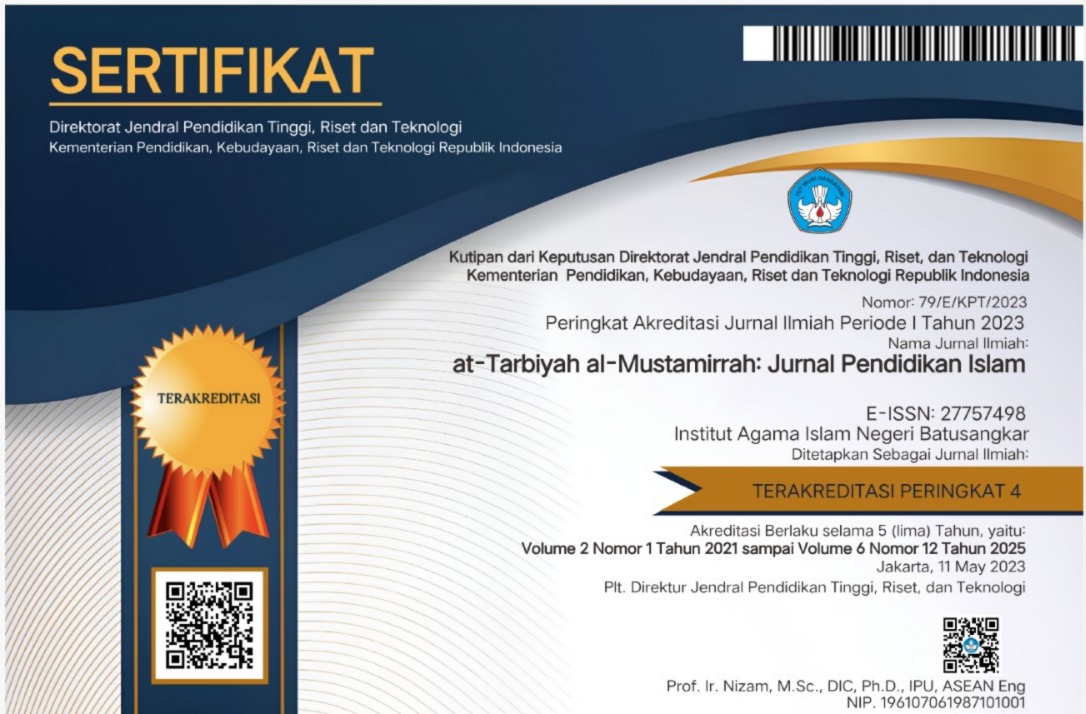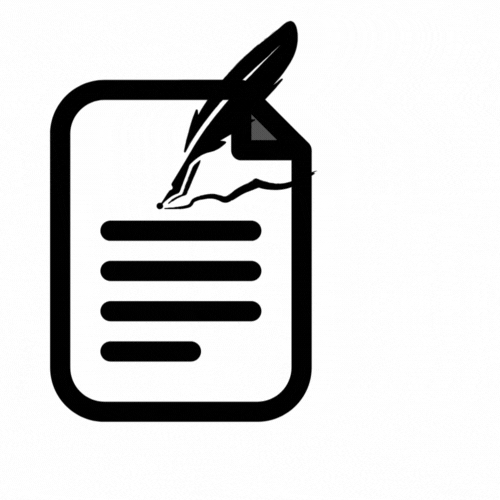Relevansi Prinsip Pembelajaran Kurikulum Merdeka dengan Konsep Pendidikan Islam (Analisis terhadap Permendikbudristek No. 262/M/2022)
DOI:
https://doi.org/10.31958/atjpi.v5i1.11643Keywords:
Relevance, Principles of learning, Islamic EducationAbstract
This research aims to analyze the decision of the minister of education, culture, research and technology number 262/M/2022 on the independent curriculum regarding learning principles and their relevance to the concept of Islamic education. This research method is descriptive analysis of ministerial decisions, the concept of Islamic education according to Islamic education experts guided by the messages of the Prophet, previous research which contains the principles of learning. The results of the study stated that the Regulation of the Minister of Education, Culture, Research and Technology No. 262/M/2022 contains learning and assessment. The five principles contained in Decree number 262 / M / 2022 are learning designed by considering the stage of development, level of achievement of students, lifelong learning design, encouraging self-reflection and carried out holistically. Learning is designed and implemented to build the capacity of lifelong learners by encouraging them to do holistic reflection.  
References
Afandi, M. &. (2023). Relevansi Kurikulum Merdeka Dalam Persfektif Pendidikan Islam. Journal of Early Childhood Islamic Education, 206.
Al Humaidi, M. B. (2002). Aljam'u Baina Shahihain. Beirut: Dar Ibn Hazm.
Attas, S. M. (1999). The Concept Of Education In Islam, A framework For On Islamic Filosophy Of Education. Kuala Lumpur: Istac.
Badan standar, K. d. (2022). Panduan Pembelajaran Dan assesmen. Jakarta: Mendikbudristek.
Bukhari, M. B. (1987). Jami'u shahih Al Mukhtashar. Beirut: Dar Ibn Katsir.
Damiati, M. (2024). Prinsip Pembelajaran Pada Kurikulum merdeka. Jurnal Of Information System and Management, 15.
Hasmawati. (2023). assesmen dalam Kurikulum Merdeka Persfektif Pendidikan agama Islam. Indonesia Journal Of Innovation Multidisipliner Research, 197.
Herwina, W. (2021). Optimalisasi Kebutuhan siswa Dan Hasil Belajar dengan Pembelajaran Diferensiasi . Persfektif Ilmu pendidikan, 175.
Jalal, A. F. (1997). Min Ushul al Tarbawiyyah Fi Al Islam. Mesir: Al Markaz Ad Duwaly Li Ta'lim Al Wazhify Li Al Kibar Fi Al Alam araby.
Kemendikbudristek. (2022). Panduan Pembelajaran dan assesment. Jakarta: kemendikbudriste.
Langgulung, H. (1980). Beberapa Pemikiran Tentang pendidikan Islam. Bandung: Al Ma'arf.
Nahlawy, A. A. (2007). Ushul Al Tarbiyyah Al Tarbiiyah Al islamiyyah Wa Falsafatuha. Dar Al Fikry Al Araby.
Nawawy, A. Z. (1392 H). Al Minhaj Syarah Muslim Ibn Hajjaj. Beirut: Dar Ihya Wa Al Turats araby.
Naysaburi, A. A. (n.d.). Shahih Muslim. Beirut: Dar Al Jayli.
Qazwayni, M. B. (n.d.). Sunan Ibn Majah. Beirut: Dar Al fikri.
Quthub, M. (1993). Manhaj Tarbiyah Al Islamiyah. Dar Al syuruq.
Sajastany, A. D. (n.d.). Sunan Abu Daud. Beirut: Wizarat Al Auqaf.
Saprudin, M. (2021). Implementasi Moetode Diferensiasi dalam Refleksi pembelajaran Pendidikan Agama Islam . Syntax literate, 5766.
Susilowati, E. (2022). Implementasi Kurikulum Merdeka Belajar dalam Pembentukan Karakter Siswa pada Mata Pelajaran Pendidikan Agama Islam. Al Miskawaih, 116.
Zaini, N. (2023). Implementasi Kurikulum Merdeka pada Pembelajaran Pendidikan Agama Islam di Sekolah Menengah Atas. Cendikia, 15.
Downloads
Published
Issue
Section
License
Copyright (c) 2024 Efi Parinda, Sri Murhayati

This work is licensed under a Creative Commons Attribution-NonCommercial 4.0 International License.
Authors who publish with this journal agree to the following terms:
- Authors retain copyright and grant the journal right of first publication with the work simultaneously licensed under a?á?áCreative Commons?áAttribution-NonCommercial 4.0 International.that allows others to share the work with an acknowledgement of the work's authorship and initial publication in this journal.
- Authors are able to enter into separate, additional contractual arrangements for the non-exclusive distribution of the journal's published version of the work (e.g., post it to an institutional repository or publish it in a book), with an acknowledgement of its initial publication in this journal.
- Authors are permitted and encouraged to post their work online (e.g., in institutional repositories or on their website) prior to and during the submission process, as it can lead to productive exchanges, as well as earlier and greater citation of published work.








